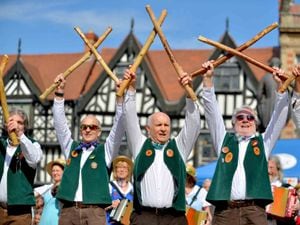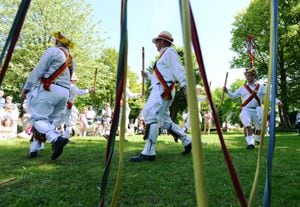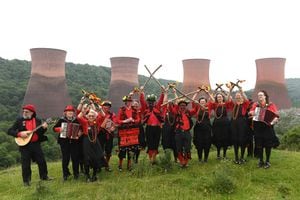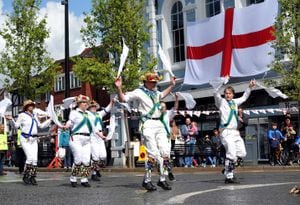Morris dancers plan a battle with bells on over May Day move
Moving the May Day bank holiday weekend has left traditional dance troupes feeling as if they have been overlooked by the government.

Next year’s traditional early May bank holiday will be moved so that the country will have the chance to celebrate the 75th anniversary of Victory in Europe Day.
Business Secretary Greg Clark said the move, postponing the annual celebration by four days, would provide “the opportunity to remember and honour our heroes of the Second World War”.
But what the minister might have imagined to be a fairly benign policy has created fury within the Morris dancing community.
Groups from across the region will be joining with allies from around the UK to march on Parliament on July 23, dressed in their full regalia.
There, they will attempt to rattle the government’s cage – or at least to jangle its ceremonial bells – to express their frustration at the move.
While Shrewsbury Morris will not be part of the march, they see many groups expressing frustration at how late the decision has been made.
“Shrewsbury Morris are not taking part in the lobby to London,” says Bev Langton.
“As a team, unlike some, Shrewsbury Morris do not have a regular commitment to the May bank holiday weekend. We generally do dance out at some point and have in the past attended some of the big Morris dancing May festivals.
“However, equally so we also have every respect for the proposed 75th VE anniversary.
“The problem seems to stem from what in may ways is such short notice. We know that festivals and events often have an 18-month lead-in to their event and therefore there is much concern for those who traditionally hold their events on the usual May Day weekend, such as the Upton-upon-Severn Folk Festival, the Rochester Sweeps event and Jack in the Green in Hastings.

“There will be many events across the country, not just those involving Morris dancing, who traditionally use both the usual May Day holiday weekend and indeed the second weekend of May and the change of date is creating much consternation. These events also often have a really important economic contribution to local communities.”
She adds: “We try not to mix Morris dancing and politics but such short notice of this date change really does make it hard.
“Hopefully the bells will be heard and if nothing else happens politicians will at least acknowledge that changes to the traditional calendar need much better advance notification.
Significance
“We’re sure that whatever happens many teams will still be dancing at sunrise on May Day morning and this will be enjoyed by everyone as usual.”
The significance of May Day for Morris dancers lies in tradition. Morris dancing always formed a part of English May Day festivals, and it is a tradition which has survived into the modern age.

John Parnell is the secretary of the Ironmen, a group based in Ironbridge that has been dancing since 1976.
He says that though the group won’t be attending the lobby either – it clashes with another dance event – he supports their objectives and says more should be done to recognise traditional May Day activities.
Mr Parnell says: “I think we almost certainly would want to support our other Morris sides who continue to protect May Day.
“I think it’s probably unlikely that we could get something organised because we’re dancing at the Buxton International Festival, but we can be there in spirit.”

Chris Burton is the squire of Bedcote Morris from Stourbridge, a mixed sex group that has been dancing since 1991.
Mr Burton says the government’s announcement, which came less than a year in advance of the change, will disrupt people’s holiday bookings and hurt events such as the Upton-upon-Severn Folk Festival in Worcestershire.
That festival’s organisers have decided to retain their existing festival dates of May 1 to 4, but because families will not be able to attend on the Monday it has shortened its programme.
“A lot of festivals are organised well in advance and people’s diaries and calendars get booked up quickly,” Mr Burton says.
“Britain has amongst the fewest public holidays in Europe anyway. If they want an extra holiday to mark the anniversary of VE Day, they could add an extra one.”





